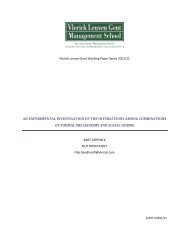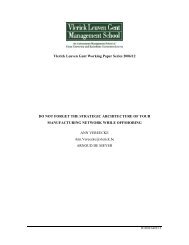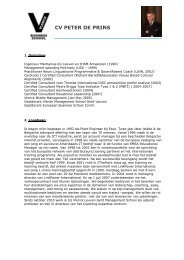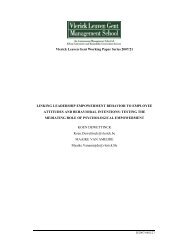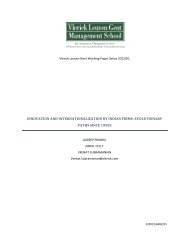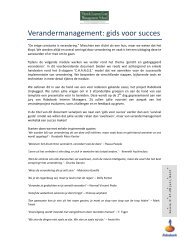Vlerick Leuven Gent Working Paper Series 2007/03 ... - Vlerick Public
Vlerick Leuven Gent Working Paper Series 2007/03 ... - Vlerick Public
Vlerick Leuven Gent Working Paper Series 2007/03 ... - Vlerick Public
Create successful ePaper yourself
Turn your PDF publications into a flip-book with our unique Google optimized e-Paper software.
The moderating role of conflict norms<br />
In addition, we expect that the strength of the relationship between board<br />
characteristics and debate, may depend on current norms regarding conflict. Norms are a set<br />
of informal, unwritten rules derived from shared beliefs which regulate board members’<br />
behaviour (Shaw, 1976; Wageman, 1995; Nadler, 2004). Although individuals behave<br />
differently, they care about how they are perceived by other group members and strive to<br />
comport themselves in accordance with group norms (Bainbridge, 2002). Bettenhausen and<br />
Murnighan (1985) consider norms as “standards against which the person can evaluate the<br />
appropriateness of behaviour,… providing order and meaning to what otherwise might be<br />
seen as an ambiguous, uncertain, or perhaps threatening situation” (p.350). In particular,<br />
conflict norms refer to standards that “encourage an openness and acceptance of<br />
disagreement” (Jehn, 1995). Conflict norms are suggested as a necessary condition for the<br />
emergence of debate (Faulk, 1982). Without these norms, the board of directors is unable to<br />
take advantage of its diversity and available expertise. Only if there is an atmosphere in which<br />
board members can freely express their opinions, open discussion will emerge. It is likely that<br />
directors will hesitate to be a ‘devil’s advocate’ if board norms do not allow critical questions<br />
being asked. Conversely, when a board of directors is characterized by a willingness to<br />
challenge and the utterance of viewpoints is expected, board members may feel encouraged to<br />
become actively involved in board discussions. This view is reinforced by the findings of a<br />
recent study by Levrau and Van den Berghe (<strong>2007</strong>). They revealed that many directors<br />
emphasized the importance of an open board culture where it is considered appropriate to<br />
engage in a vigorous debate. In addition, Amason and Sapienza (1997), found in their study<br />
on top management teams a positive impact of ‘openness’ on task conflict. Also Huse (2005)<br />
includes board culture in his research framework and has found in a recent study of<br />
Norwegian firms that ‘openness and generosity’ (one of the measures of board culture) was<br />
positively related to specific board roles. In essence, while board size, independence and<br />
diversity provide the potential for debate, conflict norms represent the catalyst that unlocks<br />
this potential. Relying on Jehn’s (1995) example, researcher could operationalize conflict<br />
norms by asking board members to rate statements such as “differences of opinions are<br />
accepted in the board”, “disagreement is detrimental to getting the work done by the board”,<br />
“critical questions are tolerated in the board”, “disagreement is dealt with openly in the board”<br />
and “directors try to avoid disagreement at all costs”. Based on the above mentioned<br />
argumentation, we offer the fourth proposition :<br />
21



